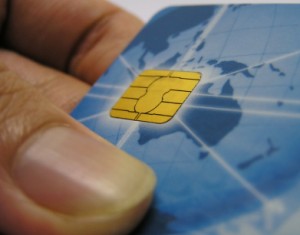 RFID credit cards, that is, credit cards that can be processed without having to scan the magnetic strip, can be either a benefit or a burden depending on whom you talk to. Several news outlets, including Fox, have reported on the increasing number of credit card data theft cases emerging as a direct result of RFID technology. Using a chip embedded in the credit card, RFID works by transmitting radio waves to the credit card processing machine without needing to make direct contact.
RFID credit cards, that is, credit cards that can be processed without having to scan the magnetic strip, can be either a benefit or a burden depending on whom you talk to. Several news outlets, including Fox, have reported on the increasing number of credit card data theft cases emerging as a direct result of RFID technology. Using a chip embedded in the credit card, RFID works by transmitting radio waves to the credit card processing machine without needing to make direct contact.
For more credit cards that work with RFID technology, use the FREE credit card finder above!
Similar to keychain credit cards and mobile phone payment processing, RFID credit cards can be swiped from a distance and be processed instantly. Because payments from these credit cards can be initiated without photo identification or signature authorization of any kind, this technology can put consumers at a risk.
If you understand how RFID credit cards work, keep them in a safe place, and check your billing statements regularly, it is unnecessary for you to avoid using them altogether. However, victims of identity theft and those that may be at a higher risk of theft and fraud may be best served by using traditional credit cards.
Are RFID credit cards safe to travel with?
Alternative forms of payment such as travelers checks are often suggested as ideal for people traveling to foreign countries simply because of safety concerns. Credit cards with RFID chips can be compromised, no matter where you are located.
Of course, you should always be alert while traveling in unfamiliar areas. However, your wallet can be stolen just as easy as information from an RFID credit card. If you will temporarily staying in a location that is associated with high crime, you will be at a higher risk of credit card theft in general.
RFID technology has been used in credit cards for nearly a decade. The equipment that is needed to steal vital information from RFID credit cards is expensive, and therefore out of the price range of the average run-of-the-mill thief. If you happen to live in a metropolitan area, travel often or just generally feel weary about using an RFID credit card, you may want to request a replacement card that does not have this feature.
How can you know if you have an RFID credit card?
Not all RFID credit cards come with disclaimers or logos prominently displayed. The easiest way to determine the types of digital payment processing features available with your credit card is to call your issuer directly. You may not be able to get a definitive answer, but you can track down the information that you need by staying persistent.
 You can also look for news stories in publications such as Popular Mechanics, which states that Chase regularly uses RFID technology within some of its credit cards. There are some credit card issuers that print small emblems and disclaimers, which indicate the use of RFID chips in their credit cards.
You can also look for news stories in publications such as Popular Mechanics, which states that Chase regularly uses RFID technology within some of its credit cards. There are some credit card issuers that print small emblems and disclaimers, which indicate the use of RFID chips in their credit cards.
RFID credit cards are not anymore likely to set off metal detectors than regular credit cards, but they can be accidentally scanned by wireless credit card companies that process payments. Your best bet is still to get in contact with your credit card issuer to determine if your credit card has an RFID chip or not.
Are credit cards with RFID becoming more common?
As retailers continue to introduce new wireless and express payment options, credit card users are finding that they are no longer being required to sign or show identification when they make purchases. Although RFID technology is not completely infallible, several recent changes have been make it more difficult for thieves to steal data.
There is no statistical data available that shows just how many RFID credit cards there are compared to traditional credit cards. Because of security concerns and general expense, it is likely that there are not that many RFID credit cards currently being issued.
You will not find RFID technology in each new credit card being manufactured. There are other security features and wireless payment options being researched and tested by credit card companies, which may eventually help to make RFID chips much safer. If you have confirmed that you have an RFID credit card, you can begin to look for merchants that accept wireless payments. This will give you the opportunity to see firsthand how many other consumers are paying on the go.
To find more RFID credit cards and compare credit card rates, visit the FREE credit card chaser!
Similar Articles:
- RFID
- How safe is RFID in credit cards?
- How do secure sleeves for credit cards work?
- Are the normal plastic credit cards going to be phased out?
- Do sleeves to protect credit cards really do anything?
- How does a magnetic protector for credit cards work?
- Apple Pay, Venmo, and Square Cash: A GateWay to Identity Theft?








